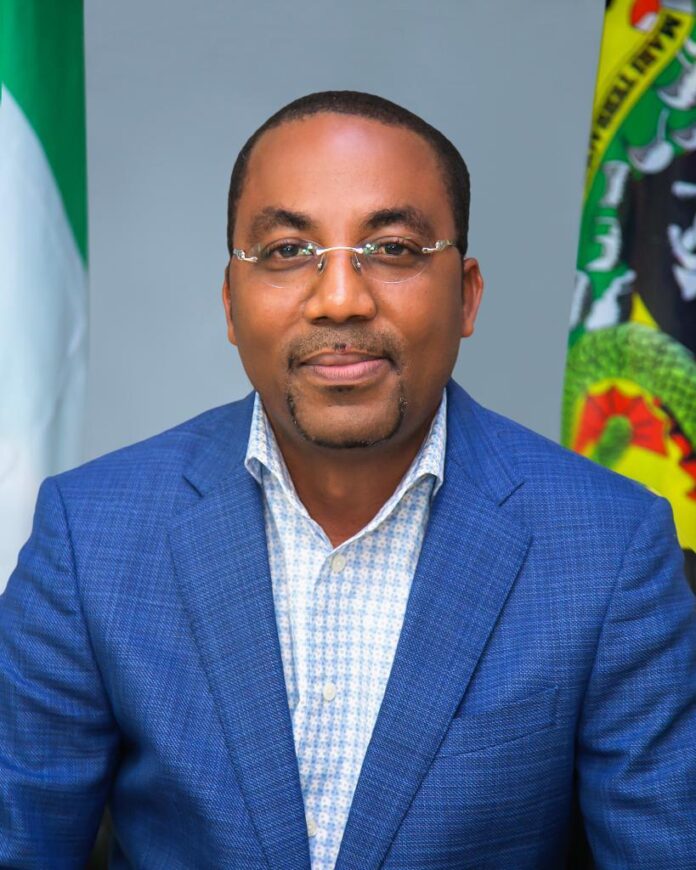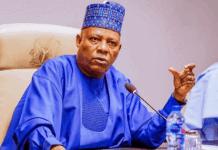Since the appointment of Mohammed Bello-Koko as the Managing Director of the Nigerian Ports Authority (NPA), the Nigerian seaports narrative has changed. The ports have wrest cargoes, hitherto, lost to neighboring countries due to improved infrastructure, effective traffic management, law enforcement that made the ports more efficient, writes Obiora Metu
Nigerian ports, before now have been described as the most expensive and inefficient in the West and Central Africa sub-region. This made the nation’s seaports unattractive to importers who prefer diverting cargoes meant for Nigerian ports to neighboring countries that have efficient port system.
For instance, neighboring Benin Republic, Togo, Ghana seaports received cargoes meant for Nigerian port because of their efficiency and ability of the ports to meet the yearnings of the importers and clearing agents.
Dilapidated port infrastructure, long cargo dwell time, vessels turn around time, long clearing process and port congestion occasioned by traffic gridlock on the port access road were basic challenges that have retarded the viability of the nation’s seaports.
This myriad of challenges contributed immensely to cargo diversion to neighboring countries by importers, thereby affecting the nation’s revenue generation and cargo throughput.
However, in the last few years, things have turned around for good following painstaking work to enforce reforms.
The crusade to restore sanity at the ports was championed by Mohammed Bello-Koko following his appointment as the Managing Director of the Nigerian Ports Authority (NPA)
Bello-Koko, was appointed acting MD of NPA on May 6, 2021 and was confirmed as the substantive MD on February 21, 2022.
Since his appointment, Bello-Koko has changed the narrative of the nation’s seaports, taking the port from the lowest ebb to be the beautiful bride to importers.
Now, Nigerian seaports are proffered destination to Nigerian importers as well as to land locked neighboring countries who prefer to route their transit cargoes through the nation’s seaports.
In fact, industry stakeholders have applauded the tremendous turnaround of the Nigeria port system in a short period especially the completion of Lekki deep seaport, championing the rehabilitation of dilapidated port access road, ending port congestion and perennial traffic gridlock on the port access road through the enforcement of Electronic Call-up system among others.
Increased Remittance To CRF
Another remarkable achievement of the NPA under Ballo-Koko’s watch is the Support of the national economy through unprecedented revenue generation and remittances to Consolidated Revenue Fund (CRF) of the federation with revenues steadily growing from N317 billion in 2020 to N361billion in 2022 and remittances progressively soaring from N80 billion in 2020 to N91 billion by financial year end 2022.
Also, the NPA under Bello-Koko has created new businesses and attendant job opportunities such as the Barge Operations services, which apart from reducing pressure on the roads has grown into a N2 billion business both from direct investment and accompanying externalities. Others are; the licensing of additional truck parks to increase capacity of trucks servicing the Lagos Ports, licensing of 10 Export Processing Terminals (EPT), to facilitate exports at Nigerian Sea Ports. This is to provide a one-stop shop for export where quality control, cargo assessment by all government agencies and issuance of good-to-ship clearance will be obtained.
There has also been a significant reduction in truck turn-around time due to successful implementation of the E-Call Up System. Enforcement of Minimum Safety Standards on trucks which stipulates that all trucks accessing the Ports are inspected, certified and issued stickers to assure safety and 65% reduction in number of accidents recorded, arising from improved standards of trucks operating within the Port premises.
Enhanced Navigational Aids, Port Security
The current management has provided and installed 86 Buoys for Warri and Calabar Pilotage Districts, for proper channel marking and route mapping. The NPA has also acquired Harbour Crafts (Tugboats, Pilot Cutters, and Patrol Boats) to eliminate delays associated with berthing and sailing of vessels and improve efficiency at the Ports. Others are: Dry-docking of various marine crafts to increase the fleet of marine crafts available for vessel support operations, procurement and deployment of Security Patrol Boats (SPBs) to all Pilotage Districts to address incessant attacks of vessels along the channels and at Ports’ waterfronts, establishment of a robust partnership with the EU-funded West and Central Africa Ports Security (WeCAPS) towards risk prevention, vulnerability assessment of port infrastructure, skills acquisition to port personnel to strengthen the security and safety of the Nigerian Ports and standardisation of Operational Procedures for Different Activities such as barging, private jetties, pilotage, vessel berthing/sailing etc.
Similarly, there has been significant reduction in the traffic gridlock along the main Port corridor and the internal access roads through enforcements, proper batching, continuous access control mechanisms and movement of cargo via barge operations, provision of 24 motorcycles deployed to aid effective monitoring of Truck E-Call Up operation at Apapa/TCIPC/Ijora axis to ease free flow of traffic, established a standing partnership with the Police high command resulting in the reduction of illegal checkpoints along the port corridor to stem abuse and extortion as well make traffic management more effective.
Enhanced Operational Capacity, Infrastructure
Another signature achievement of the Bollo-Koko leadership in the last one year was the creation of Forcados signal station to enable the NPA capture the movement of more service boats, commencement and completion of bathymetric survey for the dredging of Escravos Channels and increase Container holding capacity at Rivers Port arising from conversion of unused space within PTOL Terminal into stacking area. Others are; upgrading of infrastructure at Terminal ‘B’, Berth 7 and 8, Onne Port Complex through PPP investment by Messrs WACT Nigeria Limited of above USD 110 Million over a period of two years. This has so far achieved 62% completion. Approval was granted to Messrs Ringadars for the construction of 6,000 metric tonnes Bitumen Tank in Rivers Port Complex to improve the company’s bitumen storage capacity, which will ease their operations and have impact on the infrastructural development of the South-South. The construction is now at 58% completion.
The current management who has been at the forefront of championing the rehabilitation of collapsed port infrastructure secured approval for the construction and rehabilitation of Quay Infrastructure at Berth 15, Lagos Port Complex, Apapa. Also, approval was given for the Completion of Road Network for the integration of Berth 9,10, &11 at Federal Ocean Terminal, Onne Port.
Bello-Koko also got approval for the construction and rehabilitation of Control Towers at Lagos Port Complex and Tin Can Island Port, approval for the Supply and Installation of 180 Marine Fenders to boost the overall integrity of the quay facilities and serve as precautionary measure to prevent any form of accident arising from direct vessel impact on quay wall and completion of consultancy services for the shore protection and rehabilitation of the Escravos breakwaters, survey and mapping of Warri Pilotage District from Fairway Buoy-Warri-Sapele up to Koko Port to the prescribed standards of the UKHO Charts, which had been left unattended for decades.
Employee Welfare, Training, Industrial Harmony
It is on record that Bello- Koko is the first managing director of the authority in 15 years to increase staff salaries that had stagnated over the years. He has also increased and ensured prompt payment of pension and retirement benefits to retirees.
Also, he has ensured prompt promotion of eligible employees, allowed prompt response to demands and requests from maritime sector industrial unions (both in-house and external as well as rehabilitation and equipment of Dockyard Training Institute Apapa geared towards availing a state-of-the-art training facility for staff, members of the port community and interested corporate organization.
This is a cost-saving measure aimed at prudent management resources expended on external training facilities on the one hand and revenue generation through outsourcing of the facility to third party users on the other hand.
Engagement with World Bank, IFC
For guidance on concession renewal and review negotiations and on access to alternative sources of funding for Port Infrastructural Development as well as tracer studies for implementation of previous initiatives, NPA, engaged the World Bank and International Financial Corporation for advise. That has since been concluded.
Data Integrity and ICT
One of the banes of development in the maritime sector is the available of reliable and accurate data for planning. However, since his appointment, the Bello-Koko led administration ensured signing of Memorandum of Understanding (MoU) with the National Bureau of Statistics (NBS) for data digitalization and exchange for effective integration of ports statistics with National Database.
The NPA boss also approved the upgrading of authority’s website and Daily Shipping Position Portal and automated archiving, records management as well as upgrading of the authority’s Website (www.nigerianports.gov.ng) to a real time fully interactive platform as well as upgrade of the Daily Shipping Position Portal to be more user-friendly.
The International Maritime Organization (IMO), was Engaged on development of Port Community System pursuant to the IMO instrument on automation and digitalization of port processes.
This was followed with the award of consultancy for the deployment of Vessel Traffic Service (VTS); a maritime safety measure that equips with Domain Awareness Capability to enable us guide and provide safety information to vessels within our channels and ports approaches in line with the Safety of Life at Sea (SOLAS) conventions.
Corporate Social Responsibility
On CSR, the NPA helmsman provided a well-equipped fully functional sport facility used by all primary and secondary schools in Surulere Local Government and environs, rehabilitation and Equipping of the general hospital in Apapa Local Government Area and Bonny, acquisition and mass distribution of sewing/grinding machines for empowerment of port host communities in Rivers, Calabar and Warri to boost MSME entrepreneurial capacity. Sustained engagement with Ports host communities by the respective port managers.
Revenue Heads Review, Port Expansion
Bello-Koko in the last one year, ensured upward review of estate rent to reflect the current economic realities with a view to improve the Authority’s receivables from the management of its fixed assets. impending introduction of charges for barge movement, which had operated on pro-bono since inception in 2018.
Bello-Koko has ensured the commissioning of actual work towards the 25-year Port Master plan, ISO Certification of Onne and Calabar Ports with all other ports at advanced stages of certification, commissioning of the Lekki Deep Seaport in record time and attendant job creation opportunities from coastal shipping activities arising forthwith, in the last one year. Also, the NPA has secured FEC approval for the commencement of construction of the Badagry Seaport, provision of technical support for the establishment of Ondo and Benin Ports.
Organization-wide Reforms
The organization review embarked upon by Bello-Koko has won the NPA a level 5 “Platinum Level” by the Bureau for Public Service Reforms (BPSR) due to the current Management’s provision of an enabling environment for exceptionally high quality of work in all essential areas of responsibility, resulting in an overall quality of work that is superior, exceptional and unique.






















